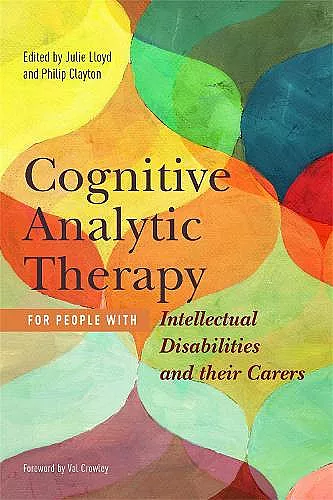Cognitive Analytic Therapy for People with Intellectual Disabilities and their Carers
Format:Paperback
Publisher:Jessica Kingsley Publishers
Published:21st Dec '13
Should be back in stock very soon

A complete introduction to using CAT when working with people with intellectual disabilities
Cognitive Analytic Therapy (CAT) is increasingly used by those providing services for people with intellectual disabilities. This book introduces CAT in practical, user-friendly language and guides readers on how to use the approach to inform their work and encourage positive change through the therapeutic relationship.
With a variety of case examples and contributions from experienced clinicians, this book introduces Cognitive Analytic Therapy (CAT) in practical, user-friendly language, and for the first time guides readers on how to use it with people with intellectual disabilities.
CAT is increasingly recognised as an effective approach for working with people with intellectual disabilities. It focuses on observing and describing typical patterns of how the client relates to others, how they behave in relationships and how they see themselves. By considering how these patterns first developed and how they can be revised in a more constructive direction, CAT can encourage change to occur as the result of healthier relationships. The contributors describe in straightforward terms how CAT may be used with people with intellectual disabilities, and provide CAT tools adapted specifically for this client group. CAT and autism, CAT with people with intellectual disabilities in forensic settings and CAT with survivors of domestic abuse who have intellectual disabilities are also explored in detail.
This is essential reading for any clinician wishing to use CAT with people with intellectual disabilities, including psychiatrists, psychologists, psychotherapists, social workers and support workers, as well as professionals across forensic services.
[This book] dissolve a division and steps into an unexpected richness where expressions labelled as 'difference' or 'disability' are witnessed compassionately, and looked at with shared curiosity and equality... It is moving as well as practical and engaging, and offers clear practical adaptations of CAT's working structure with many case illustrations and descriptions of adaptations of the CAT tools... I recommend all CAT therapists and other therapists to read this book. -- CAT, by Elizabeth Wilde McCormick, Psychotherapist and author * Journal of Association of Cognitive Analytic Therapy *
The phrase 'I don't have the words' is often heard in therapy sessions as the therapist tries to attune to the client and their needs... Thus, the adapted tools of CAT can be helpful for any situation where the client and therapist are struggling to begin a conversation... This book has been long awaited and now the client's voice is beginning to be heard as the conversations commence. I can wholeheartedly recommend this book to anyone who seeks to learn more about CAT and how it can be used wherever words cannot be found or the conversation is faltering. -- from the foreword by Val Crowley, Consultant Psychologist and CAT Psychotherapist
During the last thirty years we have witnessed a major change in provision of the psychological therapies for people who have intellectual disabilities (ID). Cognitive Analytic Therapy (CAT) became part of this process about fifteen years ago but very little has been published on it that was accessible to practitioners, families and service users. At last we have a detailed and accessible book which provides accounts of the development and use of CAT and guidance on its use with people who have intellectual disabilities. This book will inspire those who want to work therapeutically with people who have ID. It will open new doors as it will help to expand training and provision of therapists. It will demystify what CAT is and show how, with creativity, it can be made accessible to people who have ID and similar difficulties in a range of contexts. -- Professor Nigel Beail, South West Yorkshire Partnership NHS Foundation Trust & University of Sheffield, UK
ISBN: 9781849054096
Dimensions: 232mm x 169mm x 18mm
Weight: 488g
320 pages